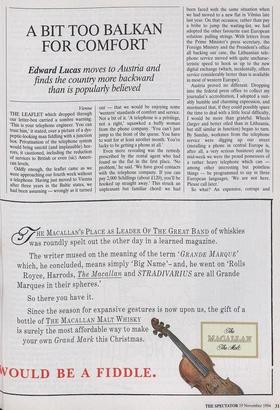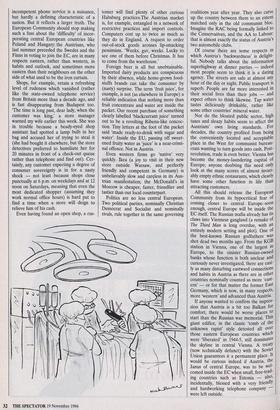A BIT TOO BALKAN FOR COMFORT
Edward Lucas moves to Austria and
finds the country more backward than is popularly believed
Vienna THE LEAFLET which dropped through our letter-box carried a sombre warning. This is your telephone engineer. You can trust him,' it stated, over a picture of a dys- peptic-looking man fiddling with a junction box. Privatisation of the telephone system would bring untold (and implausible) hor- rors, it cautioned, including the reduction of services to British or even (sic) Ameri- can levels.
Oddly enough, the leaflet came as we were approaching our fourth week without a telephone. Having just moved to Vienna after three years in the Baltic states, we had been assuming — wrongly as it turned
out — that we would be enjoying some `western' standards of comfort and service. Not a bit of it. 'A telephone is a privilege, not a right,' squawked a huffy woman from the phone company. 'You can't just jump to the front of the queue. You have to wait for at least another month. You're lucky to be getting a phone at all.'
Even more revealing was the remedy prescribed by the rental agent who had found us the flat in the first place. 'No problem,' he said. 'We have good contacts with the telephone company. If you can pay 2,000 Schillings (about £120), you'll be hooked up straight away.' This struck an unpleasant but familiar chord: we had been faced with the same situation when we had moved to a new flat in Vilnius late last year. On that occasion, rather than pay a bribe to jump the waiting-list, we had adopted the other favourite east European solution: pulling strings. With letters from the Prime Minister's press secretary, the Foreign Ministry and the President's office all backing our case, the Lithuanian tele- phone service moved with quite uncharac- teristic speed to hook us up to the new digital exchange (which, incidentally, offers service considerably better than is available in most of western Europe).
Austria proved no different. Dropping into the federal press office to collect my journalist's accreditation, I adopted a suit- ably humble and charming expression, and murmured that, if they could possibly spare the time to deal with a little local difficulty, I would be more than grateful. Wheels (larger and better oiled than in Lithuania, but still similar in function) began to turn. By Sunday, workmen from the telephone service were digging up our street (installing a phone in central Europe is, after all, a very serious business) and by mid-week we were the proud possessors of a rather heavy telephone which can among other interesting but pointless things — be programmed to say in three European languages, 'We are not here. Please call later.'
So what? An expensive, corrupt and incompetent phone service is a nuisance, but hardly a defining characteristic of a nation. But it reflects a larger truth. The European Community should stop making such a fuss about the 'difficulty' of incor- porating central European countries like Poland and Hungary: the Austrians, who last summer preceded the Swedes and the Finns in voting to join the EC, are in many respects eastern, rather than western, in habits and outlook, and sometimes more eastern than their neighbours on the other side of what used to be the iron curtain.
Shops, for example, retain a refreshing level of rudeness which vanished (rather like the state-owned telephone service) from Britain more than a decade ago, and is fast disappearing from Budapest too. `The time is long past, dear lady, when the customer was king,' a store manager warned my wife earlier this week. She was in trouble because a beady-eyed shop assistant had spotted a lamp bulb in her bag and accused her of trying to steal it (she had bought it elsewhere, but the store detectives preferred to humiliate her for 20 minutes in front of a check-out queue rather than telephone and find out). Cer- tainly, any customer expecting a degree of consumer sovereignty is in for a nasty shock — not least because shops close punctually at 6 p.m. on weekdays and at 12 noon on Saturdays, meaning that even the most dedicated shopper (assuming they work normal office hours) is hard put to find a time when a store will deign to relieve him of his cash.
Even having found an open shop, a cus- tomer will find plenty of other curious Habsburg practices.The Austrian market is, for example, entangled in a network of restrictive practices and import controls. Computers cost up to twice as much as they do in England. A request to order out-of-stock goods arouses lip-smacking pessimism. 'Weeks, guy, weeks. Lucky to see one of them before Christmas. It has to come from the warehouse.'
Foreign beer is all but unobtainable. Imported dairy products are conspicuous by their absence, while home-grown food- stuffs brands can take the consumer by (nasty) surprise. The term 'fruit juice', for example, is not (as elsewhere in Europe) a reliable indication that nothing more than fruit concentrate and water are inside the packet. Our recent purchase of something clearly labelled 'blackcurrant juice' turned out to be a revolting Ribena-like concoc- tion. Tiny letters at the foot of the packet said 'made ready-to-drink with sugar and water'. Inside the EU, passing off sweet- ened fruity water as 'juice' is a near-crimi- nal offence. Not in Austria.
Even western firms go 'native' very quickly. Ikea (a joy to visit in their new store outside Warsaw, and perfectly friendly and competent in Germany) is unbelievably slow and careless in its Aus- trian manifestation; the McDonald's in Moscow is cheaper, faster, friendlier and tastier than our local counterpart.
Politics are no less central European. Two political parties, nominally Christian Democrat and Socialist and nominally rivals, rule together in the same governing coalitions year after year. They also carve up the country between them to an extent matched only in the old communist bloc. Imagine the RAC being formally linked to the Conservatives, and the AA to Labour: that is almost exactly the status of Austria's two automobile clubs.
Of course there are some respects in which Austria's 'backwardness' is delight- ful. Nobody talks about the information superhighway at dinner parties — indeed most people seem to think it is a dating agency. The streets are safe at almost any hour of the day or night. Public transport is superb. People are far more interested in their social lives than their jobs — and expect others to think likewise. Tap water tastes deliciously drinkable, rather like some other countries' mineral water.
Nor do the bloated public sector, high taxes and sleazy habits seem to affect the Austrians' own living standards. For decades, the country profited from being the conveniently located and acceptable place in the West for communist bureau- crats wanting to turn goods into cash. Post- revolution, trade is even better. Vienna has become the money-laundering capital of Europe; anyone doubting this need only look at the many scores of almost invari- ably empty ethnic restaurants, which clearly have some other function in life than attracting customers.
All this should release the European Community from its hypocritical fear of coming closer to central Europe: soon enough, central Europe will be inside the EC itself. The Russian mafia already has its claws into Viennese gangland (a remake of The Third Man is long overdue, with an entirely modern setting and plot). One of the best-known Russian godfathers was shot dead two months ago. From the KGB station in Vienna, one of the largest in Europe, to the sinister Russian-owned banks whose function is both unclear and curiously never investigated, there are easi- ly as many disturbing eastward connections and habits in Austria as there are in other countries nominally counted as more 'east- ern' — or for that matter the former East Germany, which is now, in many respects, more 'western' and advanced than Austria.
If anyone wanted to confirm the impres- sion that Austria is a bit too Balkan for comfort, there would be worse places to start than the Russian war memorial. This giant edifice, in the classic 'tomb of the unknown rapist' style detested all over those eastern European countries which were 'liberated' in 1944-5, still dominates the skyline in central Vienna. A treaty (now technically defunct) with the Soviet Union guarantees it a permanent place. It would be curious indeed if Austria, the Janus of central Europe, was to be wel- comed inside the EC when small, free-trad- ing countries such as Estonia — also' incidentally, blessed with a very friendly and hardworking telephone company --- were left outside.



















































































 Previous page
Previous page